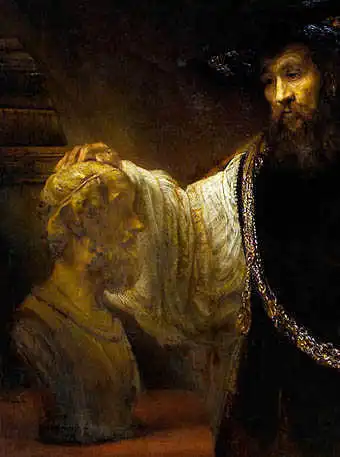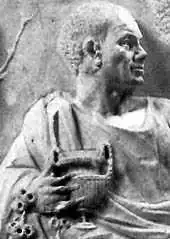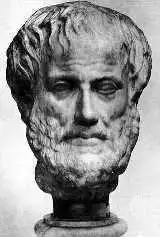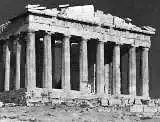Aristotle's Poetics: Followers The Drama Theory and Influence of the PoeticsAfter AristotleAs stated above, a quick glance through the western history of dramatic theory primarily serves to underline the importance, not to say the sole dominance, of Aristotle. That this should be true also for the Roman writings can come as no surprise, but the only preserved work of any extensive substance on the subject, The Art of Poetry by Horace, stands on its own. It was almost as widespread, through the centuries, as the corresponding work by Aristotle, and referred to with just as much reverence. And those several centuries when Aristotle was lost to the Europeans, Horace was well spread and known.
The thoughts and perspectives of Aristotle, though, are easily traced in those of Horace. The stage is already set, Aristotle's outline of the drama has established itself, to the extent where little of its lines are crossed by later thinkers — certainly not by Horace, who comes very near to being a sort of abbreviated version of The Poetics.  Horace. HoraceQuintus Horatius Flaccus lived in the first century BC, and had studied philosophy at the schools in Athens. He published Satires and Odes, and around the year 20 BC the Epistle to the Pisos, or Art of Poetry, based on a treatise by the Alexandrian Neoptolemus of Parium, the work of whom is not remaining, nor is its date.The Art of Poetry, with its sometimes very drastic metaphors, has been present and quoted in numerous works, especially in relation to its principle of pleasure and profit, as a sort of primary force in drama. It should be noted that, somewhat contrary to Aristotle, Horace speaks not exclusively about the drama, the play to be performed by actors on a stage, but more generally about "poetry," that is storytelling, one could say fiction, in all its forms and genres. Certainly, he focuses on the story as it is written, and not on its enactment. So, in his case, the principles expressed apply equally well to both drama and fiction. This is just as true about a number of writers to follow him — they spoke about the written story, whether it is for the stage or for reading only, making differences between them in some aspects and not in others. Although stating some few things about the formal rules of the drama, such as the ideal of making it neither more nor less than five acts long, and observing that a comedy calls for a style of writing different from what should be used in the tragedy, Horace is more concerned about general matters, applying equally to all forms of storytelling. In most cases his advice is quite concrete and practical, standing the test of time excellently. He starts off by comparing it to a painter putting a horse's head on a human neck — as a bad example of story making: "the book will be perfectly like such a picture, the ideas of which, like a sick man's dreams, are all in vain and fictious." The story has to make sense, and furthermore, Horace demands that it be "merely simple and uniform," whatever the subject. He suggests for the writer to choose a subject according to his abilities, and a wisely chosen subject surpasses even what the best style or poetic talent can accomplish. Still, the work is well served by some poetic talent, since "a mediocrity in poets neither gods, nor men, nor [even] the booksellers' shops have endured." The poet should beware, and carefully examine his writing before publishing: "You will have it in your power to blot out what you have not made public: a word once sent abroad can never return." Either stick to a traditional tale, and be true to it, or invent new fables — but they, too, need to be consistent, "congruous to themselves." Fact and imagination can be intermingled, but it has to be done so that "the middle is not inconsistent with the beginning, nor the end with the middle." What is made up should have "as much likeness to truth as possible." Yet, Horace does not cling to a belief in the natural, the truth in itself, nor does he abandon it. He comments on the much discussed question whether good poetry is derived from nature or from art, and concludes the necessity of their mixture: "so much does the one require the assistance of the other, and so amicably do they conspire." What cannot be neglected is the writer's compassion, a genuine engagement, without which the reader or audience is simply not moved at all. It takes feelings to awake feelings in the audience: "As the human countenance smiles on those that smile, so does it sympathize with those that weep. If you would have me weep you must first express the passion of grief yourself." For similar reasons, though, Horace warns against performing scenes which would be tasteless or in other ways too unpleasant for the audience to behold. "Let not Medea murder her sons before the people." Such things should be acted "behind the scenes." Whether a character is invented or picked from the well known mythological or legendary fauna, he or she must be presented consequently, so that Achilles is indefatigable, wrathful, and "let him deny that laws were made for him." A new, invented character must be "preserved to the last such as it set out in the beginning, and be consistent with itself." Horace also has advice regarding the appearance of gods — it should be avoided, unless "a difficulty worthy of a god's unraveling should happen." As for the wisest choice of subject, he refers to the Socratic papers, and when the choice is made with the aid of such wisdom, "the words will spontaneously accompany the subject." In spite of the use of such elevated sources, he strongly advises against pompous announcements, brought forward at the very beginning of the story, insisting on its importance. Of this he uses another drastic metaphor: "The mountains are in labor, a ridiculous mouse will be brought forth."
His advice is direct and practical: "just now say what ought just now to be said," which is a guideline having lost none of its actuality since his days. Still, he has little belief in the immortality of poetic splendor, noticing that "words perish with old age, and those lately invented flourish and thrive, like men in their youth." Indeed, he sees no other outcome: "We and our works are doomed to death." In spite of this, he finds that there are numerous poets who decide to devote their lives to accomplishing "such a famous death," and though they are sadly mistaken, he advises to let them be, let them follow this path, though futile — since
they wish to: "He who saves a man against his will, does the same with him who kills him." Middle AgesTo find some writing of any substance after Horace, on the subject of drama and its theory, we have to advance into the Middle Ages and on, where commentators mainly referred to Horace, until Aristotle's Poetics appeared — and then his words were the laws to which all thoughts on the drama related.The emergence of a Christian Era is evident. Whereas Aristotle and Horace were mainly occupied by what would make a drama most pleasing to its audience, the commentators of the Middle Ages are quite preoccupied by formalities, moral content and what could be generalized as the duties of drama. Original thought as well as innovation is scarce, words chosen have little to do with lustful experience, but relate tightly to academic and even clerical rhetoric. Frequently, the texts primarily speak out the fact that they are written by people who never wrote such plays as the ones they theorize about — or any other fable at all. Beginning with Aelius Donatus of the 4th century, his On Comedy and Tragedy, where Horace is quoted but Aristotle completely absent, contains several of the main ingredients of the medieval debate on drama. To him, the lesson of comedy is to "learn what is of use in life, on the one hand, and what must be avoided, on the other." He divides all stories (fabula) into the two categories comedy and tragedy, stating the former to fit only a setting of commoners, whereas the latter should be filled with noble characters, "in kingly halls." This division has been repeated countless times through the following centuries — relating to, but deviating from Aristotle, who spoke of virtue rather than aristocracy. In the case of Donatus and those repeating his definition later on, the nuance is no doubt primarily caused by the careful strategy of not at all making fun of kings, thereby making their presence in comedy impossible. Royalty and aristocracy could be portrayed as pitiful, cruel, vindictive, even tyrannous, but never as ridiculous. Donatus claims Livius Andronicus to be the first of the Latins to invent comedy - whereas the Greek originator is unknown to him — and quotes him as having stated that "comedy is the mirror of everyday life." Also quoted is Cicero's similar statement on the matter, calling comedy "a copy of life, a mirror of custom, a reflection of truth." Donatus then goes on to define a structure of the comedy, dividing it into four classes of plays: the title-rôle, the scene of action, the situation and the outcome. Also, he points out three kinds of comedy: the Palliata in Greek costume, the Togata where the actors wear toga, and Atellana, where the wit and jokes give it away, and not the costumes. He continues to divide the play itself into four parts: the prologue, the Protasis, the Epitasis and the Catastophe. The prologue, again, exists in four kinds, according to Donatus, the first a laudatory where the author is praised, the second where an opponent is cursed or the audience thanked, the third where an outline of the plot is told, and the fourth which contains a mix of the above. The Protasis, then, is where the action begins, "wherein part of the play is developed, and part withheld in order to create suspense." In the Epitasis there is an ascent, with further development of the story, as well as additional difficulties, what Donatus calls "the knot of the entire coil." The Catastrophe is at the very end, where the solution "pleasing to the audience" arrives, and all that has preceded it is clarified. Before Donatus there is little more than some chiefly moral perspectives on the drama, such as that of Tertullian in the 2nd century and St. Cyprian in the 3rd. Apart from the moral reasoning, they get their perspectives on drama mainly from Aristotle and Horace. In the time of Donatus was also Evanthius, writing on drama in a similar manner, and the grammarian Diomedes, who wrote a summary of dramatic principles according to De Poetis by Suetonius, a book which does not remain. Several of the early church fathers commented more or less, usually the latter, on drama — also Augustinus — with a strictly moral perspective. Isidore of Seville, of the 7th century, has two small sections on drama in his Origines, or Etymologiae, mainly based on Horace. In the 12th century Aristotle's The Poetics is translated and commented by the Moorish philospher Averroës. The imprint of Aristotle on drama theory in Europe was to take some more time, though. In the century of Averroës, John of Salisbury in his Policraticus still refers to Horace, knowing nothing of Aristotle's words on the matter. Also Dante Alighieri, in the 14th century, clings to Horace, in what little he has to say on dramatic theory — an incidental passage in Epistle to Can Grande, from around 1318, where he comments on his Divina Commedia, explaining why he calls it a comedy.
Tragedy, he states, "in its beginning is admirable and quiet, in its ending or
catastrophe foul and horrible," whereas comedy may begin in trouble but "hath a happy termination." As for style of language he points out that the former is "lofty and sublime" and the latter "mild and humble." His story ending happily in Paradise, and its language "the vulgar tongue in which even housewives hold converse," therefore can be nothing but a comedy. The renaissanceThere may be no end to what changes in European society came with the Renaissance, but in the field of dramatic theory one stands out among the others: the introduction of Aristotle's The Poetics. But it was slow in arriving. The first Oriental version, into Arabic, was made in the 10th century, and again by Averroës in the 12th, being translated into Latin the following century by the German Hermann, and again by Mantinus of Tortosa in Spain, in the 14th century. Still, reference to Aristotle was extremely rare. In 1498 came Giorgio Valla's translation of The Poetics in Venice, then the Aldine edition of the original Greek text in 1508, followed by different translations in 1536 (Pazzi), 1548 (Robortello) and 1549 (Segni). Robortello's In Librum Aristotelis de Arte Poetica Explicationes was the first complete commentary of Aristotle's book.One of the earliest treatises of The Poetics was by Vida in De Arte Poetica, in 1527, but plenty were to follow shortly — such as Trissino, Daniello, Maggi and Lombardi, Muzio, Varchi, Cintio, Minturno, Vettori and Castelvetro. Horace remained as an important source in these commentaries, but swiftly the words of Aristotle were gaining weight and volume. The beginning was clearly Italian, with the French, the Spanish and the English following eagerly by the end of the 16th century. The patterns become clear and uniform, early on, to be repeated with little variation by practically all of the commentators. Several of them point out, like Daniello in La Poetica from 1536, that comedy deals with ordinary situations and people, "not to say lowly and commonplace", while tragedy deals with "deaths of high kings and the ruin of great empires." That this is so frequently pointed out should rather be seen as an example of how rigid the hierarchy was in those days, than as a genuinely dramatic rule. Kings were not to be made fun of, and commoners were not to be taken too seriously. Daniello also explains, somewhat in line with the principles of Aristotle, the necessity to have bad men turn good instead of the good turning bad: "it does not seem to me permissible to introduce into it just and virtuous men changed into unjust and wicked ones through the adversity of fortune — a thing rather shocking than pitiful or fearful. On the contrary, one must show the wicked and the evil changed by fortune into good and just men." Sebastiano, also known under the name Minturno, belonging to the clergy, does in Arte Poetica of 1563 agree with Daniello on the difference between comedy and tragedy, but introduces a third: satire, also having to deal with "humble persons" but who are also "mean and ludicrous". He agrees with Horace that the plays should provide pleasure and profit (for the comic poet he specifies the mission to be "that of teaching and pleasing", whereas from tragedy we should learn "not to place too great trust in worldly prosperity"), and states that this is accomplished if the story includes some change of fortune — "from good to ill, or from grievous to gay." Additionally, he demands that the whole story transpires in a day, at least not goes beyond two (for an epic poem, though, the limit is a full year) — and the performance should be "not less than three hours nor more than four." About the structure of the drama, Sebastiano mentions six essential parts: the plot, the manners or customs, the sentiments, the words, the singing and the apparatus on stage. The story is told by episodes, which should be "few and brief", and the parts of the play are four, in partial accordance with Aristotle: Prologue, Discourse, Chorus and Exit — all, as with both Aristotle and Horace, arranged properly in a beginning, a middle and an end. In his Poetices Libri Septem of 1561, Julius Caesar Scaliger repeats the idea of tragedy dealing with nobles and comedy with commoners — about the latter summing the plot up in a sentence: "The beginning of a comedy presents a confused state of affairs, and this confusion is happily cleared up at the end." And on tragedy he states that "it is by no means true, as has hitherto been taught, that an unhappy issue is essential to tragedy. It is enough that the play contain horrible events." Scaliger relies heavily on Aristotle, interpreting him to have fixed the rules of the drama with much less liberty of movement than can safely be said to be supported in the text of The Poetics. In line with many other commentators, Scaliger insists that the content of a play should be as concise as possible, "yet also as varied and manifold as possible." This he deems to make up a performance of somewhere between six and eight hours. Lodovico Castelvetro stressed the three unities of drama, which were to be passionately debated again and again, in European discussions of drama theory. This he did from an overly rigid interpretation of Aristotle. The time of a play's events should be no more than twelve hours, states Castelvetro in Poetics of 1570, since "there is no possibility of making the spectators believe that many days and nights have passed," and for the space occupied he demands that the scene of the action must be only one, and not as big as a city or even a house, but "that one place alone which could be visible to one person." He makes it clear that the unities are needed for no other reason than to make the spectator accept what takes place on stage — that is, conforming to the very limited ability of imagination he regards the audience to have. As for the unity of action, stating that a play should have one action only, "or two whose interdependence makes them one", Castelvetro makes this a necessity because of the limited time span of no more than twelve hours, and the limitation of space to one single room. Not much can take place in this tiny segment of life. Regarding the two opposites comedy and tragedy, he states that "tragedy can have either a happy or a sorrowful ending, as can comedy," but goes on to explain how these endings still differ in nature, between tragedy and comedy, and later on decides that "tragedy without a sad ending cannot excite." He agrees, certainly, with the general view of comedy being about commoners, and tragedy about nobility. In France, the first reference to Aristotle was probably made by Thomas Sebillet in his Art Poétique of 1548, where he compares the old French "moralité" with the antique tragedies. He divides plays, or Dialogue, into three kinds: the Eclogue, with pastoral setting and "conversing of deaths of princes, the calamities of the times" and such, the Morality, which he equals to the Greek tragedy, and the Second Kind of Morality, somewhat allegorical, focusing on a moral issue "for our instruction, or guidance in our manners." Sebillet complains about the mixing of the different kinds of plays, he finds taking place in his time, combining morality and farce and thereby "making of our plays a hotch-potch." Jean de la Taille is credited with having formulated the third unity: place. This he may very well have deducted from Castelvetro. He was himself a playwright, explaining his trade with many a detail and a passionate language in Art de la tragédie, 1572, a text accompanying his first play, where he states the tragic poetry to be "the most elegant, beautiful and excellent of all." He explains why the tragedy needs a sad theme — the subject must be "pitiful and poignant" to achieve the "true and only end of tragedy," which is "to move and arouse keenly the passions of each of us." As for the unities, he claims the need of same day, same time, same place, simply because that is what can "easily and decently be performed." The audience would not be convinced by trickery, such as to have characters die on stage, wherefore he states firmly that "it was not art when some one, with too little reverence, performed the crucifixion of our great savior on the stage."
Literature
AristotleIntroductionAristotle's LifeTimelineAristotle's PoeticsAristotle's Cosmology
The Greek PhilosophersAbout CookiesMy Other WebsitesCREATION MYTHSMyths in general and myths of creation in particular.
TAOISMThe wisdom of Taoism and the Tao Te Ching, its ancient source.
LIFE ENERGYAn encyclopedia of life energy concepts around the world.
QI ENERGY EXERCISESQi (also spelled chi or ki) explained, with exercises to increase it.
I CHINGThe ancient Chinese system of divination and free online reading.
TAROTTarot card meanings in divination and a free online spread.
ASTROLOGYThe complete horoscope chart and how to read it.
MY AMAZON PAGE
MY YOUTUBE AIKIDO
MY YOUTUBE ART
MY FACEBOOK
MY INSTAGRAM
MY TWITTER
STENUDD PÅ SVENSKA
|
 Cosmos of the Ancients
Cosmos of the Ancients